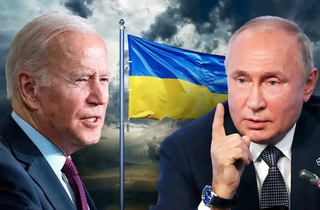The Kremlin and its mouthpieces launched a multi-pronged attack, denouncing the aid as reckless and self-serving, while threatening retaliation.
Leading the charge was Maria Zakharova, spokesperson for the Russian Foreign Ministry. Taking to Telegram, she vehemently condemned the aid to Ukraine, labeling it "direct sponsorship of terrorist activity." This inflammatory rhetoric reflects Russia's attempt to delegitimize the Ukrainian government and paint them as the aggressors.
Kremlin spokesman Dmitry Peskov echoed Zakharova's condemnation, but with a more economic twist. He argued the aid would enrich the US at the expense of Ukraine, further crippling the nation and leading to more Ukrainian casualties. This framing positions Russia as the defender against a predatory US meddling in a regional conflict.
Peskov reserved particular scorn for a provision allowing the US to seize frozen Russian assets and use them for Ukrainian reconstruction. He warned this action would severely tarnish America's image and foreshadowed unspecified retaliatory measures. This reaction highlights Russia's sensitivity to its economic vulnerabilities and its desire to deter further financial sanctions.
Zakharova didn't stop at Ukraine. She denounced aid to Taiwan as "interference in China's internal affairs," siding with China's claim over the island nation. This aligns Russia with a powerful ally and presents the US as a disrupter in the region.
Israel's inclusion in the aid package also drew criticism. Zakharova argued it would lead to "escalation and an unprecedented rise in tension" in the Middle East. This framing suggests the US is fueling regional conflicts, deflecting from Russia's own role in the Syrian civil war.
The near-unanimous condemnation from Russia suggests a coordinated effort to discredit the US aid package. However, cracks may appear in this facade. Former president Dmitry Medvedev, known for his hawkish stance, predicted a Russian victory regardless of the aid, implying a belief in Russia's military might over US financial muscle. This could signal internal disagreements about the most effective response strategy.
The US, on the other hand, has presented the aid package as a critical investment in global security and a counterweight to Russian aggression. The coming days will reveal how each side navigates this geopolitical chess game, with the fate of Ukraine, Taiwan, and regional stability hanging in the balance. (ILKHA)



 Güncel
Güncel
 Güncel
Güncel
 Ekonomi
Ekonomi
 Güncel
Güncel
 Güncel
Güncel
 Güncel
Güncel
 Güncel
Güncel
 Dünya
Dünya
 Dünya
Dünya
 Dünya
Dünya





